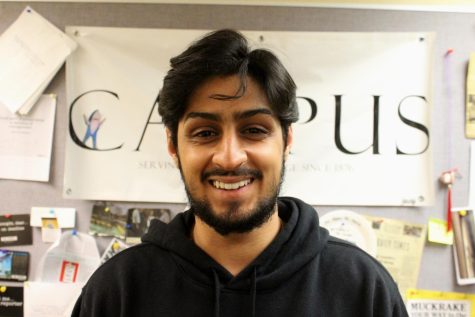College working towards Middle State reaccreditation
The boardroom in the Tippie Alumni Center, where some of the reaccreditation working groups meet.
As the school year picks up, so too does Allegheny College’s push to become reaccredited. This process will continue until an outcome is determined in 2023.
Accreditation is a process administered by an evaluative body called an accrediting agency. Colleges are examined to ensure that they are offering a quality curriculum and education to their student body.
Middle States Commission on Higher Education is the accrediting agency administering Allegheny’s reaccreditation. Middle States will oversee the operations of Allegheny and determine whether or not Allegheny qualifies for reaccreditation based on federally approved standards and expectations according to Jennifer Dearden, professor of music, associate provost and interim registrar.
“We need (Middle States’) stamp of approval which says that Allegheny College provides quality education and is an institution that students should consider when looking for a college (to attend),” Dearden said.
Accreditation and reaccreditation is a legal requirement for colleges, according to Dearden.
“The federal government requires institutions of higher learning to be accredited according to set standards and expectations regarding different elements within an institution,” Dearden said.
Accrediting agencies impose benchmarks and expectations for institutions to meet in order to achieve accreditation. The same method is used to reaccredit institutions once they have obtained initial accreditation. Professor of History and Global Health Studies Kenneth Pinnow explained that reaccreditation takes place periodically.
“Once a college has become accredited by its accrediting agency, it must be evaluated on the same goals and expectations later on to become reaccredited,” Pinnow said. “Reaccreditation takes place every five to 10 years.”
The standards and requirements established by Middle States are clear and consistent and can be found on the Middle States website. These are requirements like paying taxes and having an actively enrolled student body. Dearden discussed the details of Middle States’ standards and requirements.
“There are seven standards and 15 requirements of affiliation,” Dearden said. “The requirements are somewhere along the lines of meeting federal standards, having a publicly accessible curriculum or having an institutional mission.”
The College aims not only to gain reaccreditation under the approval of Middle States but also to analyze and overview its functionality as of now and going forward, according to Dearden.
“Our goal with this (reaccreditation) is two-fold,” Dearden said. “We aim to not simply meet and exceed reaccreditation requirements but to also aim to look at our institution top to bottom and determine if what we are doing is what we want to be doing.”
Dearden and Pinnow are serving as co-chairs of the self-study committee and are responsible for overseeing the reaccreditation process at the College. They are also ex-officios for the working groups that have been established for self-study in the reaccreditation process. Self-study is the term given to the process in which the institution seeking reaccreditation produces a report on its performance and functionality. Pinnow explained the role of working groups in the reaccreditation process.
“We as an institution have certain priorities around which we will base our self-study and our working groups,” Pinnow said. “The working groups are based around curricular and assessment, student success, sustainable financial and institutional structures and community engagement.”
Working groups consist of students and faculty and staff members. Each working group is focusing on its respective institutional value. Members of the working groups will work to collect data and view reports and other data to determine the level to which the College is meeting the given standards and requirements. Thion Lee, ’24, is part of a working group.
“I have learned so much about this institution from having my position in the community engagement group,” Lee said. “Our goal is to assist by looking at previous reports and observing whether or not the school kept its standards.”
Members of the working groups are chosen from different communities within the college to produce a diverse self-study report. The main role of the members of the working group is to provide authentic feedback in relation to the College meeting standards posted in previous reports.
“So far I have realized that the school did not meet a lot of standards in certain areas, as it was focused too much on certain areas and not enough in others,” Lee said. “Honestly, our job in these groups as students is to provide honest feedback to the school so that it can realign itself with its standards.”
Lee remarked on the importance of student involvement in self-study working groups.
“I believe that I have been given a position where I can make an impact,” Lee said. “I am a student and I believe that we (students) deserve to have an opportunity to play a role in the running of our school.”
The reaccreditation process spans over the course of two years and requires a self-study report that will be written by Dearden and Pinnow with material from the working groups according to Pinnow.
“The working groups will be working till the upcoming May if not longer,” Pinnow said. “Once we have sufficient feedback from the working groups, Professor Dearden and I can start on our lengthy self-study report.”
Middle States will be doing a preparation visit on Tuesday, Sept. 14. There will be an open Zoom meeting with a Middle States representative. A link for the meeting will be posted on My Allegheny. Dearden emphasized the importance of the meeting.
“All those who are interested are highly encouraged to join,” Dearden said. “This is a great opportunity for everyone to learn more about our institution and more.”

Hassan Javed is a junior from Lahore, Pakistan. He is majoring in Communication and Media Studies while minoring in Psychology. This is his third year...

Sami Mirza is a senior from many different places. He is majoring in International Studies with a focus on the Middle East and North Africa and minor in...












